While pumpkin seeds may be small, they shouldn't be underestimated for that reason - they're bursting with essential nutrients. Even a small amount of these seeds can be enough to provide a substantial amount of magnesium and healthy fats that we need to survive.
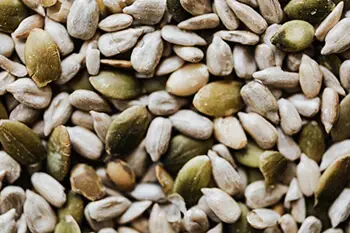
It's no surprise, given their nutritional value, that pumpkin seeds are thought to have a number of impressive health benefits. From cancer prevention to better heart health, there's a lot to be said about this humble seed - something you may usually throw away when preparing pumpkins.
What makes these tiny seeds even more attractive is that they're easy to add to your diet, so you don't have to make huge sacrifices to benefit from them.
This guide will share the top benefits of pumpkin seeds that are supported by scientific evidence:
1. Bursting With Valuable Nutrients
First off, the nutritional content of pumpkin seeds is a benefit in itself. When you buy these seeds from a health store or a supermarket, they'll typically not have a shell - so, unlike the large, white seeds you get in a pumpkin, they'll be green, flat, oval-shaped and smooth.
In a single 28-gram serving of these seeds, there are around 151 calories. These calories are mostly from the fat and protein content. Calories aside, pumpkin seeds also have a high amount of carbohydrates, protein, fat, vitamin K, manganese, magnesium, iron, phosphorus, copper and zinc. You might not know exactly what all of these nutrients are, but they're all needed for overall health and wellness.
2. Antioxidant-Rich

There are several well-known antioxidants in pumpkin seeds, including vitamin E and carotenoids. If you don't already know the benefits of antioxidants, they can help protect your body's cells from free radicals, which can damage cells and cause inflammation. For that reason, it's recommended that we consume antioxidant-rich foods like pumpkin seeds on a regular basis to ward off various health problems.
It's thought that one of the reasons why eating these seeds is so healthful is because of their antioxidant properties. One study found that when rats with arthritis took pumpkin seed oil, the oil could reduce inflammation. Unlike an anti-inflammatory drug, the oil didn't cause any side effects in the rats.
3. May Reduce The Risk Certain Cancers
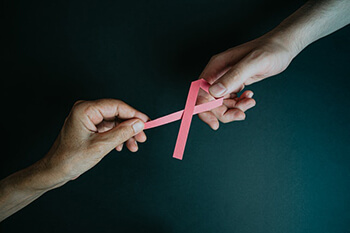
Research has found that people who eat pumpkin seeds in their diet may benefit from a lower risk of various cancers, including breast, colon, stomach and lung cancer. In a large study, results showed that the consumption of pumpkin seeds could reduce the risk of breast cancer in particular in postmenopausal women.
In another study, researchers suggested that the lignans, a type of polyphenol, in pumpkin seeds could help to treat and prevent breast cancer, and yet another study found evidence that eating pumpkin seeds could provide the same benefits in preventing prostate cancer.
4. Support Bladder and Prostate Health
Benign prostatic hyperplasia (BPH) is a condition that causes the enlargement of the prostate gland in men, which can make it difficult to urinate. Scientific evidence suggests that pumpkin seeds may be able to reduce the symptoms of BPH and improve quality of life for people diagnosed with the condition.
One study of men with BPH found that consuming pumpkin seeds resulted in a reduction of symptoms, and additional evidence suggests that taking these seeds may also help generally to treat an overactive bladder in both men and women.
5. High Magnesium Content
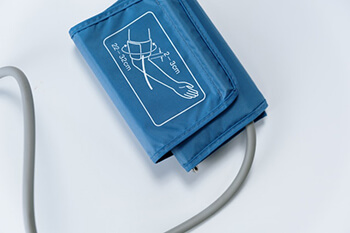
Magnesium can be found in trace amounts in a number of foods, but not usually enough to provide us with what we need. Pumpkin seeds are rich in plant-based magnesium - and it's important that we're not deficient in magnesium, despite the fact that deficiency is very common in some parts of the world.
Our bodies need magnesium intake to carry out important chemical reactions, which can help to control blood pressure, help improve bone health, help reduce the risk of heart disease, support the formation of healthy bones, regulate blood sugar levels, and much more.
6. May Boost Heart Health
Poor heart health is often directly linked to our dietary and lifestyle choices. It's important to eat the right foods to support our hearts, and pumpkin seeds contain heart-healthy magnesium, omega 3 fatty acids, antioxidants, and a high zinc content, making them a great choice.
In animal studies, researchers found that pumpkin seed oil can reduce both high cholesterol and high blood pressure. As both of these are risk factors for heart disease, reducing them is important for maintaining heart health in the long run.
Another study in women found that supplements of pumpkin seed oil could reduce blood pressure and even increase levels of HDL ("good") cholesterol. Though we don't fully understand the reason behind the heart-health benefits of pumpkin seeds, some studies suggest that nitric oxide in pumpkin seeds, which expands blood vessels and prevents plaque growth in the arteries, may be the cause.
7. Naturally Lowers Blood Sugar
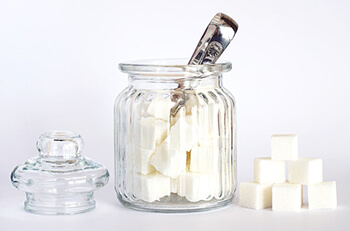
If you have high blood sugar, you're at risk of type 2 diabetes, or you have diabetes, listen up: emerging studies on animals have found that eating pumpkin seeds, pumpkin seed powder and even juice from pumpkins, are capable of reducing blood sugar.
People with diabetes struggle to manage their blood sugar levels, and research suggests that adding pumpkin seed powder, juice or pumpkin seeds may help to naturally reduce blood sugar levels. It's thought because pumpkin seeds are a good source of magnesium, this may be the reason why they're effective in treating high blood sugar and even reducing the risk of type 2 diabetes. However, more research is needed before we can properly understand the benefits of pumpkin seeds for diabetes.

8. High Fiber Content

We need dietary fiber to support our digestive systems. If you're suffering from bloating, constipation, wind or reflux, it may be because you don't have enough fiber in your diet - and you should definitely stock up on pumpkin seeds! With just over 5 grams of fiber in a single serving with the shells included - a good percentage of your recommended daily intake - these seeds are ideal for promoting good digestive health.
The benefits of diet that's high in fiber don't just stop at digestion, however, despite what most people think. Eating plenty of fiber can also reduce heart disease risk, and even reduce the risk of type 2 diabetes and obesity. Keep in mind that pumpkin seed without the shells have a lower fiber content, so it's best to find those with their shells still on for the best fiber benefits.
9. Improved Sperm Quality
There are a number of factors that are linked to low sperm count or poor sperm quality. Some of these factors, such as genetics, are out of our control, but others, such as low zinc levels, can be managed by our diets. Low levels of zinc in the body are thought to be linked to an increased risk of male infertility, and considering pumpkin seeds are a rich source of zinc, it makes sense that the seeds may help to improve the quality of sperm.
There's evidence to support this idea, too. An animal study looked at how zinc may improve sperm quality after damage caused by autoimmune diseases and chemotherapy, and the results were positive. Additionally, because pumpkin seeds are a good source of antioxidants, the seeds may help to support overall health by contributing to healthy levels of testosterone.
10. May Improve Sleep Quality

A bad night's sleep may be caused by a poor bedtime routine, stress and anxiety, and a poor diet. Adding certain foods to your diet may help you to get better sleep, and pumpkin seeds are one of them.
Because they're a natural source of tryptophan, an amino acid that can promote sleep, pumpkin seed is a natural means of getting to sleep at night. That said, you'd need to eat at least 200 grams of pumpkin seeds before bed every day to get enough tryptophan to really see an improved difference. Seek medical advice if you're unsure.
Additionally, the zinc in pumpkin seeds can provide some extra sleep health benefits. It can convert tryptophan to serotonin, which the body then converts into melatonin, which helps to regulate the sleep-wake cycle. Pumpkin seeds are also a good source of magnesium, which is also linked to good sleep.
11. Improve Immune Function

We know that pumpkin seeds are a great source of zinc and iron, and both of these nutrients are essential for supporting the immune system. Iron can attack invading pathogens and change their shape, making them unable to cause harm, while also supporting the activation of immune cells. Zinc, similarly, helps to kill off pathogens and encourage the proper function of immune cells.
Additionally, pumpkin seeds have anti-fungal and anti-viral properties that make them ideal for treating various immune disorders. They're rarely a trigger of intolerances and allergies, either, which is a bonus point.
Whether you're looking to avoid getting ill or simply support immune health, you may be able to do so by eating these seeds regularly.
12. Hair Growth Benefits

If you'd rather not eat them, you can still get the health benefits of pumpkin seeds in oil form. Pumpkin seed oil has been found in research to treat male pattern baldness and generally encourage new hair growth.
According to one recent study, the benefits of this oil are linked to it being an excellent source of vitamin E, phytoestrogen and omega 3 fatty acids. Simply apply the oil to your scalp, leave for half an hour, then rinse and follow with your usual hair washing routine if you want to try it for yourself.
13. Simple To Include In Your Diet
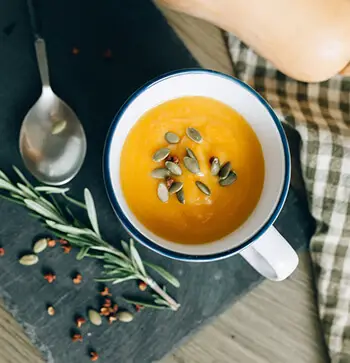
Perhaps the best benefit of this healthful seed is that it's totally affordable and easy to add to your current preferred meals. You can buy de-shelled pumpkin seeds pretty much anywhere - just head down your supermarket's nuts and seeds aisle or stop off at your local health store.
If you're specifically looking for the seeds with their shells on, you'll find plenty of options online.
You may choose to eat them raw or roasted as a snack, or use them to top savory salads and sweet dishes like smoothie bowls and porridge. Many people use pumpkin seeds in baking, too, when making cakes, biscuits and bread.
Conclusion
Being rich in such a broad range of nutrients, pumpkin seeds are the health food that we all need in our lives. Aside from the benefits mentioned in this guide, it's thought that pumpkin seed can also help to promote high levels of energy and improved mood.
To make the most of the health benefits of pumpkin seeds, start adding them to your diet, whether you choose to eat them as a satiating snack or simply use them as a crunchy topping for your savory dinners. If you have any reason to believe you shouldn't eat pumpkin seeds, seek medical advice from your doctor before adding them to your diet.

